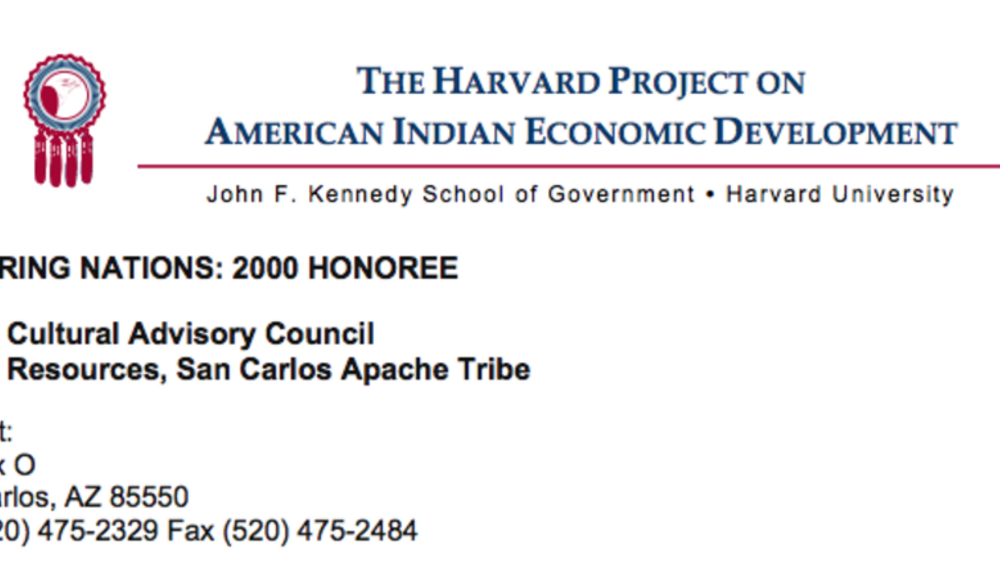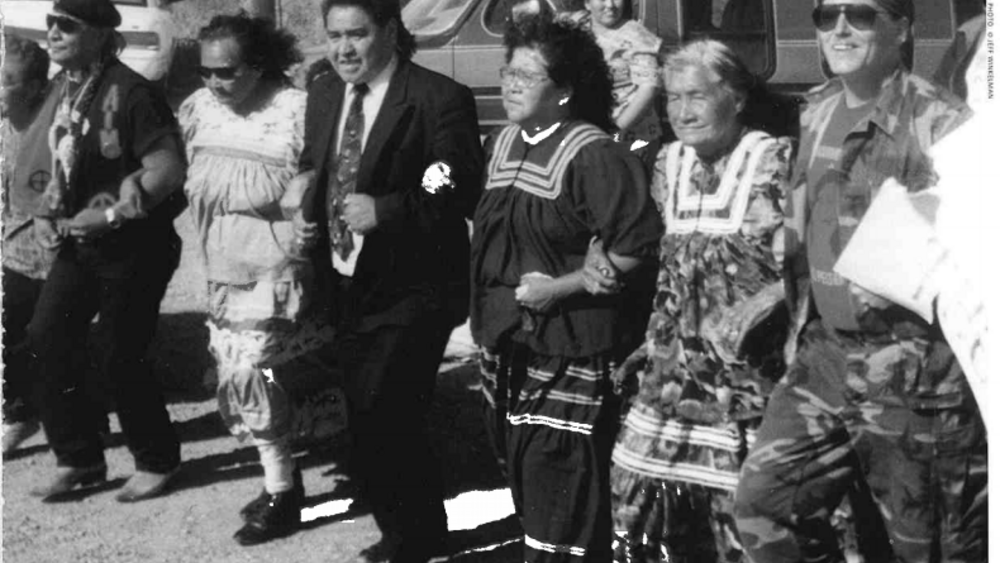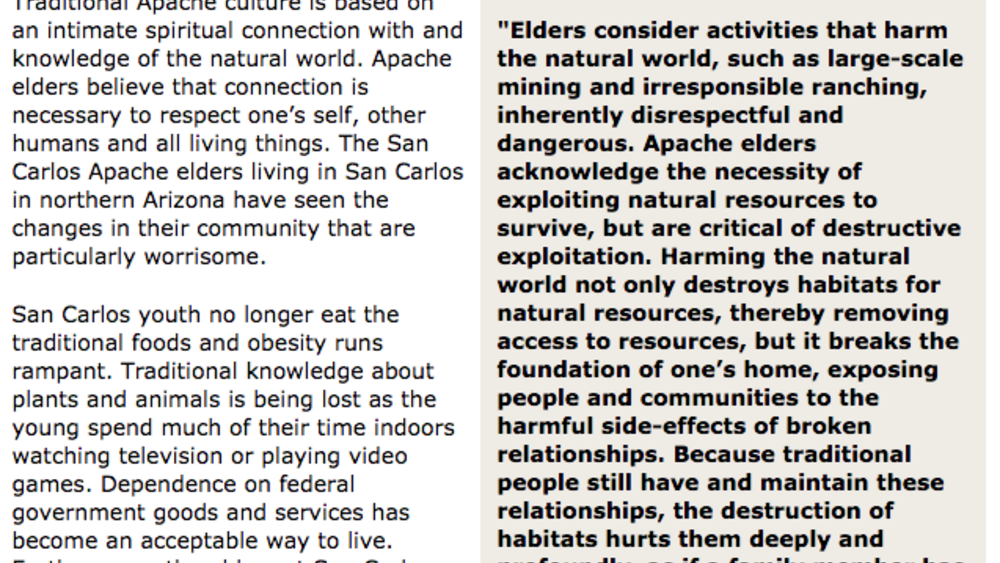Jeanette Cassa (1929-2004), Coordinator of the San Carlos Apache Elders Cultural Advisory Council (ECAC), discusses ECAC's work and the traditional Apache core values that its member elders work to instill in the younger generations of Apache people. She also stresses the importance of tribal leaders living by those values and listening to their people.
Additional Information
Cassa, Jeanette Clark. "San Carlos Apache Elders Cultural Advisory Council." Honoring Nations symposium. Harvard Project on American Indian Economic Development, John F. Kennedy School of Government, Harvard University. Sante Fe, New Mexico. February 8, 2002. Presentation.
Transcript
Jeanette Clark Cassa:
"[Apache language] Good evening and we had a good day today and may it all be well today. My name is Jeanette Cassa and I'll try to do like the Navajos do. My name is Jeanette Cassa [Apache language]. The [Apache language] is very almost extinct now. There's just a few people [Apache anguage] probably extended out to the Navajo countries. But this is what I am.
I have an outline here and I'm going to try to make it short. I'm not quite used to speaking out in public. I'm used to being on top of the mountains looking for herbs, looking for plants, and naming the animals in Apache and birds out there for the education, the school. It says here that I'm going to talk about the past. Well, my...I was born in 1929 just when my father and my mother, we were beginning to realize that there is another world that they have to get in the trend of. And my great grandmother had been a prisoner of war, my paternal grandmother. She used to tell us stories about the prisons and it was very sad out there. They were roaming in the mountains but they came back, they were settled down in the valley and they...from there my father was born and then I came in.
Just when tribal council in 1934 -- I was about five years old when they developed the constitution. And the constitution took place then, so it was developed. And the tribal council was called the administrators at first and they advised people, they worked with the people real good and they never sat...they have some letters yet that they have written and it says there that not...it doesn't say 'I' and the chairman doesn't say, 'I.' He says, 'This council' and then he signs his name last while the councils, the district councils signed their names first. In those days they prayed and they got together and they prayed as they were developing the constitution. I believe that's why it still holds today. Only about one or two was amended in 1954.
But since I had gotten out of school I've been with the, helping out the council all the time and I felt that they were my relatives because I was an orphan. I had relatives in Mescalero, but there was quite a distance. So I grew up helping out the council. In those days the cultural principles of the...they gave advices on that according to the principles of life and whatever. Those things are gone today when you look at it, they're gone. They're gone and even in the English language, way back when Moses came there was a law put forth like the 10 Commandments. Do you ever stop to look at that? We had something like that. Don't do this or don't do that, but do this.
In the mornings when you got up you started out with your right foot, your right hand, whatever you were going to do. You were told to start with the right hand, your right foot so everything will go well with you for the day. They used to do that and then they say, 'Don't beg for things. Let it come to you or hunt for it, work for it yourself. Look for it.' Like when our people were in mountains those days they looked for food. They were constantly scratching around for food or looking, searching for food to eat so they were busy during the day. The men were out hunting, the women were at home or roasting agaves or looking for nuts and whatever they can eat. So they were constantly busy like the ants and that kept them slim in those days. And the food that they ate kept them healthy because they were natural foods.
So that's how their life was in those days and as we became...when the constitution came in, in those days we became a ward of the government. And then I went back to the reservation and as soon as I got home the council put me on the election committee so I had been with that until 1990. In 1954, I have seen two chairmen that were running who shake hands when one of them won. There [were] no harsh words; no criticizing one another, but they shook hands and that was good in 1954. After that it got out of hand. So that's where we are at today.
And the modern things that we learned that take place; I'm not as good as what Andrew [Lee]...but I do try to help anywhere, everywhere you help out. Your parents, your great grandmother told you, 'If you help out, it will come back to you in a thousand folds' is that they taught us. If you are a leader, don't hoard everything, give until you are the last one, take the last one or whatever you gave you got the smaller one and gave the bigger one away. It is not like this anymore.
There are a lot of words and teachings that have gone out of our lives everywhere, not just San Carlos. I believe it's with every tribe and even the modern world, the cities, everywhere. I had some experience in the earlier days, in 1950s the council decided that they needed to send people off the reservation to get work out there, to get a job, find a job and you were supposed to be out there and be educated. In other words, they told us, 'Be civilized' or assimilate with the public out there. So they sent us out. I have been there. I have been to San Jose, California and I've been to Dallas, Texas, but one day I decided that I needed to come home. I didn't have very many relatives at home, but I don't know why I came home, but someone told me that maybe you were meant to go home and help out. So all this time I've been doing it.
In 1990, when the NAGPRA [Native American Graves Protection and Repatriation Act] came in, my partner Seth [Pilsk] came out to me when I had retired from teaching at Globe High School, the Apache language, and I had retired and came home and I was sitting there. One morning he came up to me and said, 'Will you go to work with me?' I said, 'I retired'. He said, 'It's just for 18 months.' And it has gone...it has gone beyond that. It's almost 10 years, 10 years is coming up. But I went to work with him. We have worked on a lot trying to...we even worked with the [Northern Arizona University] with a science or something there was supposed to be taught in the school and we're still on that. And we're working on place names, putting every Apache name on a place where it...where the Apaches had been. So our map is just covered with black dots all over and on the side there because we couldn't put the whole name in there we just put it on the side.
That's where I am and the tribe today, the council today like here, they're here. I don't see any of my council member or maybe they're a little jealous of me, I don't know. But they do work with us. 1993 we presented a resolution. One reason we realized that we need a resolution to bring the elders council is that there are things, there are sacred things, there are traditions that are sacred, and we need permission from the elders in the community, the medicine men. So in order to work well with them we presented the resolution and they approved it. So we've been working under that. And that's what we've been doing all this time.
We do work with other companies like ADOT [Arizona Department of Transportation]. We receive letters, even from the arch science and the archaeologists that come in, but now we have Vernelda [Grant] on board as an archaeologist. So we send all those to her. And that's the reason why some other people haven't heard from us. But we've been called out everywhere and today I would say that I need to take speech lessons. I'm not as well...I'd rather be out there on the mountain and we do take people out. We have our elders' meeting and you've got to be patient with them. You have a meeting with them as a group like this, but you go over it again and visit them individually.
There's one thing we don't know anymore too and that is enduring things -- the cold, the heat, and other things -- we cannot sit still long enough. I notice that in the children as I try to bring these back, the other day. Our children are not working much anymore, too. So one forester has developed a thing where he can train the younger boys for the firefighters. So he asked me to come out there and talk to them and I did and I try to think about what I should say, but their attention span is short. So I try to make it short. I told them little stories. Like one day the firefighters got on the bus. A long time ago in the '50s the truck used to go up and down and they would honk the horn and then the men hears that whether they're drinking or not they go stand out there; some of them were drunk. But they got on the truck and they'd jump on the truck because they were able-bodied men. They were men that knew how to work. So they got on the bus. When the truck brought them to the bus they got on there, they threw the bottle away. It was time to put that bottle away and go. They got on the bus and got to wherever they were going and when they got there they fixed their bedding and they went to sleep right away, as soon as they got there. And the next morning they got up early and started work. They left the bottle behind and the job was a job and they went and did it. That's what I told the boys. It's time to put something away and get to work. There are a lot of other stories like that that I told to the boys.
But it's true about everything else. You people have... I listen to you talk and you have brought everything out, everything and maybe somebody wrote it down and everything that is needed as being a leader or working with the people. You brought everything out and mentioned it but there's one thing, when you become a leader, you kind of get tempted with things. And there's a little pool, maybe money or maybe something or maybe travel like this, you get tempted by that, and you spend more time out there and the work is back there. Nobody mentioned that one. But remember, you have to think twice before you can make a move. What's going to happen to me if I do this? There was one thing that I told the boys about that was; there was an elderly man that talked to us when I was working for the CAP office. He said, 'At 25...' He was telling us a story and he said, 'When you're away, somebody calls you and say your wife is out there or your husband is out there doing this. And you think is she really or is she home? And it gets in your way in your work and pretty soon it becomes a monster and you rush home and most likely you'll find your wife at home safe, doing all the work.' That was one...that's what this old man told me and that has been with me all this time. I thought about that. 'You'll get infatuated with someone at one time or other, but if you follow it, you're going to make a fool of yourself. You're going to lose everything and you'll just be out there all alone.' That's what he said. And so I remembered it and that's been with me all these years. I lost my husband to cancer two years ago, but that kept me straight. Things like that, the elderlies tell you.
Another one was...another one was that...he said...he said something else; stories like that. The women, my elders are full of them...will tell you a lot of things. He goes and visit the community. He involves with the community. He visits the people. So that's who we are, the elders. Today we're going to try to, no matter how hard it is, we're going to try to work, bring in the students, the young boys that are dropouts; we're going to try to work with them. We're going to try to work with the councilmen. We already do advise them, but when somebody wants, a leader wants something real bad, he will persuade someone or persuade the group to go along with him. And how do you go about that? You have to sit down and think it out and try it, getting it out there. So that's what we're trying to do. And I don't know how long it's going to last, how long NAGPRA's going to last. We do a lot of things. My secretary is Seth Pilsk. We'll think about it, we'll say about it, but he's going to write it down. We'll tell him and we'll read it over and say, 'This is not right.' Sometimes he gets angry and writes his own words, but we tell him, 'Don't do that.' So he's our secretary and he helps us, he's willing to help us. And he'll laugh and erase it out. So that's why he's with us and he's a botanist and I work with him. We have so many jobs. We've done a lot of ethnohistory with the Carlota Mines, Payson. Pretty soon we're going to Aravaipa and Winkelman. That's what we're doing and we'll be busy out there again.
We do need your help also in solving this problem about our leaders. How do we get them to work? How do we get them to listen? Will you listen to me, will you remember what it said or will you just ignore it? I said to Andrew, I said, 'The chairs are empty, go ahead and put me on.' But that's what we live by, the wisdom of the elders. There are a lot of good things what to do and what not to do. They used to say, 'Don't envy someone because it's no good.' There are a lot of things and probably your tribe is like that also. That's what we're trying to...trying to bring in and make it and work with the modern things, the modern teachings. That's what we're trying to do. I'm sorry that I'm just...like I said, I'm not used to making speech, but I can really holler and yell out there in the forest. Thank you."



